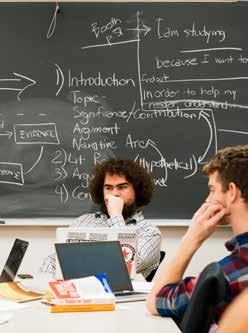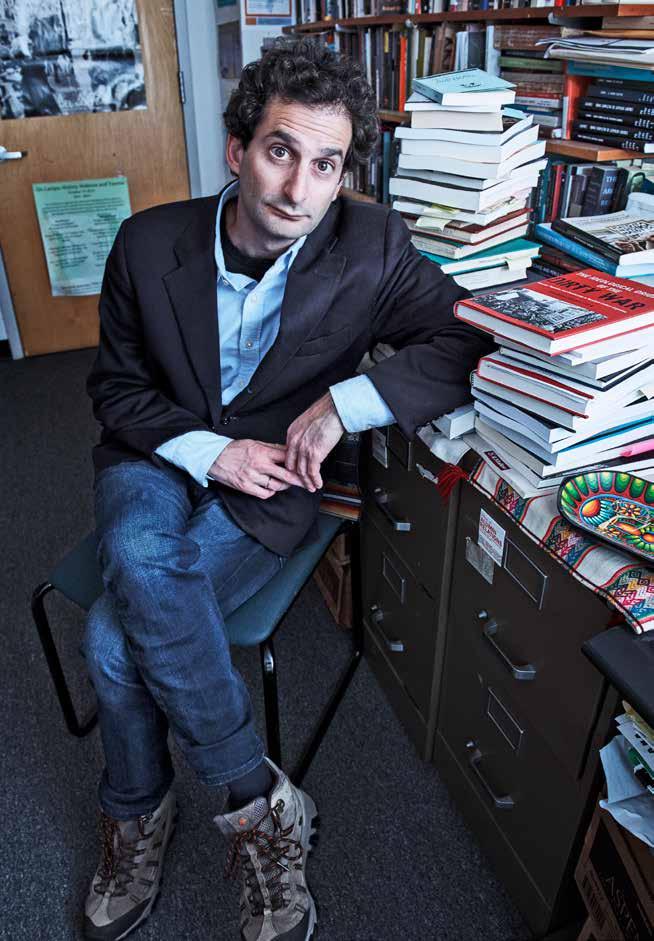
8 minute read
Historical Studies
from 2020 NSSR Viewbook
I. OVERVIEW

II. DIALOGUES

Historical Studies Overview
Knowledge of history is critical to all human understanding. In keeping with the critical traditions of The New School, the program in Historical Studies at The New School for Social Research (NSSR) conceives of history as a way of thinking, a form of inquiry, and a mode of critique. Inspired by the program’s founders—Helen and Charles Tilly, Joan Scott, Perry Anderson, and Eric Hobsbawm—the faculty share a deep commitment to the historical interrogation of social power.
The MA program combines training in history with coursework in the range of disciplines taught at NSSR. Its practice of interdisciplinarity rigorously engages with distinct ways of understanding the world. For historians, as well as our colleagues in other social sciences, The New School offers a special environment for fostering and amplifying interdisciplinary conversations.
As members of the vibrant NSSR intellectual community, Historical Studies students and faculty investigate the past in order to address the most pressing questions of the present. Our course offerings cover a wide range of historical periods and world regions, with particular strength in the large-scale transformations of the modern era. Our diverse approaches to historical research reflect the insights of critical social theory. Areas of faculty expertise include the history of capitalism, the history of political violence, history and theory, and public history.
Students enrolled in the terminal MA program receive intensive mentoring and collaborate with our faculty on a sustained basis. We prepare our students in the critical assessment of scholarship, the diverse methodologies of historical research, and the imaginative act of relating history to the contemporary world.
Equipped with a robust critical apparatus for thinking about the modern world, our graduates pursue a wide variety of careers. Many enter PhD programs at NSSR or in history departments at other top universities. Others pursue careers in teaching, journalism, activism, government service, and other fields.
Degrees Offered
Historical Studies offers the MA degree. Students with an MA in Historical Studies, Sociology, or Politics from The New School for Social Research may apply to study in the PhD program in Sociology or in Politics and receive their PhD while adding a specialization in Historical Studies. Students with an MA in History or Politics from another institution may apply for admission directly into the PhD program in Politics with a specialization in Historical Studies.
Recent Courses
America’s Empires Historical Roots of Contemporary Populism Slavery, Race, Capital Historiography and Historical Practice Histories of Capitalism The Politics and Poetics of Infrastructure
Recent Outcomes
Ella Coon (MA ’19): Doctoral Student, Columbia University Deren Ertas (MA ’19): Doctoral Student, Harvard University Aidan Devaney (MA ’17): Head of Research, The New Historia Awis Nari Mranani (MA ’16): News Presenter and Producer, KOMPAS TV Gema Santamaria Balmaceda (PhD Sociology and Historical Studies ’15): Assistant Professor, ITAM

Finding Historical Connections Between Multiple Disciplines
Federico Finchelstein Professor of History
Proof that polymaths not only exist but thrive at NSSR, Federico Finchelstein investigates the relationship between history and political theory, specializing in fascism, the Holocaust, genocide, Cold War dictatorships, and human rights violations. A member of a history department steeped in the interdisciplinary tradition, Finchelstein enriches and enhances his own work by collaborating with colleagues in political science, sociology, and philosophy. He now examines the dimensions of 20thcentury political ideology and practice, from fascism to populism, focusing on Argentina. In the past five years, Finchelstein has published several books including El mito del fascismo: De Freud a Borges (Capital Intelectual, 2015), which analyzes the antifascist thinking of Sigmund Freud and the Argentine writer Jorge Luis Borges, as well as From Fascism to Populism in History (University of California Press, 2017) and its companion book, A Brief History of Fascist Lies (University of California Press, 2020).
Finchelstein’s extensive historical scholarship does not prevent him from turning his eye and his pen to present-day political concerns. One of the many NSSR professors who can be regarded as public intellectuals, Finchelstein often writes op-ed articles for national publications, including the New York Times and the Washington Post, as well as international ones including major Argentine, Brazilian, and French newspapers. His recent opinion pieces have focused on authoritarianism, populism, and the candidacy of Donald Trump. Finchelstein encourages this kind of public engagement in his students and teaches a course in which writing op-eds is a requirement.
Students who come to study with Finchelstein can expect individualized attention and guidance. He prides himself on providing an intellectual environment in which students can investigate issues of interest to them in terms of their connections with both the academy and the public sphere. He co-edits books with students to help them advance their own research and establish their individual voices. In addition, Finchelstein’s interactions and collaborations with other Historical Studies faculty—including Julia Ott, a prominent intellectual specializing in the history of capitalism; Eli Zaretsky, a world-renowned historian of psychoanalysis; and Jeremy Varon, a scholar of political ideologies and the role of political violence—broaden his perspective, enabling him to give students a multifaceted historical education they would not receive elsewhere.
Discussing the Past, Present, and Future of Capitalism with Julia Ott


Julia Ott Associate Professor of History
[00:00.00] Interviewer: What topics do you research and write about? What led you to be interested in those topics? And where do you see your research moving in the future?
[00:00:15] Julia Ott: My interests lie in the history of capitalism. Specifically, I’m interested in capitalism as a historical phenomenon and as a social phenomenon that needs to be explained rather than assumed. My previous published work examines the development of the American financial markets in the 20th century. My current work focuses on the ideas behind the policies that gave rise to the inequality that we live with today.
[00:01:08] IN: Now, in interrogating those ideas, do you ever put forth research or papers that challenge the way society does things now, or do you only focus on those ideas from a historical perspective?
[00:01:35] JO: I would say that contemporary issues of economic justice inform my historical research. I think it’s important to study history and to know history as we debate the economic circumstances in which we live. An understanding of the past is fundamental to thinking about future possibilities for our economic system.
[00:02:21] IN: Can you discuss your teaching methods in the context of NSSR’s history of heterodox pedagogy? [00:02:37] JO: My approach to teaching in the history department is collaborative with students and informed by their interests and concerns. Within history I draw heavily upon primary sources, and I support students in pursuing their own primary research.
As an NSSR professor, I teach students from multiple departments, exposing them to the literatures of many disciplines, but always grounding our work in history. My goal is for students to develop a thorough understanding of how different disciplines approach—both theoretically and empirically—capitalism, to understand it as an analytical concept and as a real-world phenomenon that varies across time and space.
[00:04:33] IN: Provide more detail about your past role as leader of the Robert L. Heilbroner Center for Capitalism Studies. How did the position influence your teaching and research?
[00:04:49] JO: The Heilbroner Center was an exciting endeavor for me. Leading the center helped me remain current on innovative trends in theories about capitalism. It kept me upto-date on research about the state of the national and global economies. It exposed me to a wide range of thinking and writing about the future of capitalism.
Because the Heilbroner Center’s interests lie in developing both new approaches for studying capitalism empirically and innovative thinking about how to envision and achieve a more just economic future, it’s an exciting place for students. They augment their knowledge and they broaden their perspectives beyond the boundaries of their own discipline or program. Mainly, the Heilbroner Center helps students to think critically about capitalism in a robust and rigorous manner.
[00:07:05] IN: What would you tell students interested in studying history here at NSSR, both about the department and about the school as a whole?
[00:07:13] JO: I don’t think that there’s any better place for interdisciplinary exposure. Everything we do here is interdisciplinary,
whether or not it’s a co-taught situation, because students so often enroll in courses outside of their discipline. I don’t think students always realize that when professors are challenged, when they read and engage with new literature outside their disciplines, it keeps the professors engaged, it keeps them on their toes, it sparks new questions and lines of inquiry. We become more effective and more compelling instructors and advisors. It also makes for a more exciting classroom experience when you’re all learning together and nothing can be taken for granted or assumed. Students and faculty constantly generate new insights in this collaborative interdisciplinary atmosphere. It’s very exciting.
[00:07:46] IN: What are the characteristics or traits that make for a great graduate student at NSSR?
[00:07:56] JO: A willingness and desire to examine their own fundamental assumptions, both as scholars and as citizens.
[00:08:23] IN: Recently there’s been a rise in the study of capitalism, both in the academy and then outside, as not just this monetary thing but as a social and political thing. Do you have any thoughts about why that shift has happened? And if you do, can you talk about that a little bit? [00:08:42] JO: I think after the financial crisis of 2007 and 2008, people across this country and really around the world were not only dissatisfied with the measures that were taken but were also deeply aware and deeply disappointed that nobody seemed to be able to provide them with any good explanations. So I think there’s a newfound willingness to examine prior assumptions and conventional wisdom about our economic system and really try to reassess what we think we know in a very fundamental way. And a desire to think broadly about what’s possible within a capitalist economy and maybe even about what might lie beyond capitalism and whether, as a society, we should go there. To truly do this work requires theories and philosophies of justice, as well as comparative study across history, regions, and nations all over the world.









